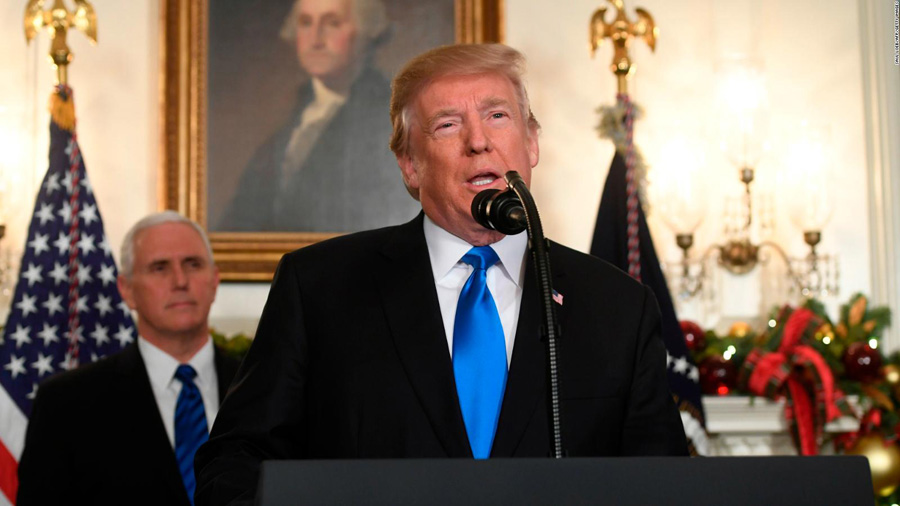Australia/Israel Review
Between the lines of Trump’s Jerusalem announcement
Dec 19, 2017 | Seth J. Frantzman

Seth J. Frantzman
On Dec. 6, in a 13 minute, 1,200 word speech, US President Donald Trump recognised Jerusalem as the capital of Israel.
Although he promised a departure from failed policies of the past and sought to put his imprimatur on the peace process, much of the speech he gave was based on careful wording intended not to upset the status quo too much.
It was crafted with careful attention to carry Trump’s own message, alongside a message the future administrations could stand by. The following are several key elements of the statement:
We cannot solve our problems by making the same failed assumptions and repeating the same failed strategies of the past.
Trump promised when he came into office to move beyond the problems he claimed to have inherited from past administrations.
Some of these related to what he sees as failed policies in the Middle East, wasted lives and money.
Like Obama before him, Trump wants to depart from these failures and try something new.
I have determined that it is time to officially recognise Jerusalem as the capital of Israel. While previous presidents have made this a major campaign promise, they failed to deliver. Today, I am delivering.
Trump wants to remind voters that he has accomplished something in 2017, after almost a year in office. This is a campaign promise he can deliver.
He’s trying to break with former presidencies and distinguish himself.
The Israeli people have built a country where Jews, Muslims, and Christians, and people of all faiths are free to live and worship according to their conscience and according to their beliefs.
Jerusalem is today, and must remain, a place where Jews pray at the Western Wall, where Christians walk the Stations of the Cross, and where Muslims worship at Al-Aqsa Mosque.
Here the speechwriters have carefully chosen “Israeli people” and not “Jewish people,” trying to be cognisant that Israel is not just made up of Jews. The “Israeli people” are contrasted with the three monotheistic religions.
It’s interesting they chose the “stations of the cross” and not the Holy Sepulchre which is probably because Protestants do not have a space in the Sepulchre, and one of Trump’s base of support has tended to be among more rural Christian Americans.
But today, we finally acknowledge the obvious: that Jerusalem is Israel’s capital.
The centrepiece of the speech, doubling down on mentioning Jerusalem, which is mentioned eighteen times in the speech, compared to “Israel” which is mentioned twenty-three times.
The word “obvious” feels very Trump-like. Diplomats tend to shy away from “obvious”, in favour of complex terminology and views that are not obvious. The Golan is obviously part of Israel, but according to the UN is still part of Syria, for instance.
This will immediately begin the process of hiring architects, engineers, and planners, so that a new embassy, when completed, will be a magnificent tribute to peace.
Here, Trump seems to lapse into a discussion about building something “great” in America.
During the campaign he often references his acumen as a builder of things, such as in Atlantic City, or the numerous places that have the “Trump” name.
There was no reason to delve into the minutiae of “hiring architects, engineers and planners,” but this is classic Trump.
I also want to make one point very clear: This decision is not intended, in any way, to reflect a departure from our strong commitment to facilitate a lasting peace agreement.
We want an agreement that is a great deal for the Israelis and a great deal for the Palestinians.
We are not taking a position of any final status issues, including the specific boundaries of the Israeli sovereignty in Jerusalem, or the resolution of contested borders. Those questions are up to the parties involved.
The second part of the speech seeks to re-assure local allies in the region that the US Administration will stand by its commitment to “lasting” peace.
This term “lasting” is one of the meaningless generalisations regarding “peace” that always finds its way into US policy statements.
Trump adds a flourish though – “a great deal” – to show that he has taken part in this statement.
In the meantime, I call on all parties to maintain the status quo at Jerusalem’s holy sites, including the Temple Mount, also known as Haram al-Sharif.
Here the speechwriters wanted to make sure to include the Islamic holy site, a quiet communication to Saudi Arabia and Jordan that the US cares about the holy sites and the status quo.
This is a historic status quo reference from the 19th century, one that the Hashemite Kingdom of Jordan takes very seriously as a custodian of the holy sites.
I repeat the message I delivered at the historic and extraordinary summit in Saudi Arabia earlier this year.
Trump seeks to reach out to Saudi Arabia which has been one of his closest allies in the region.
Saudi Arabia was not only the site of his speech to 50 Muslim countries in the spring, but also the Kingdom has been pushing Palestinian Authority President Mahmoud Abbas to make peace.
In the region the Saudis are widely blamed for Trump’s decision and they are accused of accepting the recognition quietly. Trump wants to remind listeners the Saudis are on his side and he is on theirs.
Dr. Seth J. Frantzman is a veteran journalist who is currently Opinion Editor at the Jerusalem Post. © Jerusalem Post (www.jpost.com), reprinted by permission, all rights reserved.
Tags: Israel






